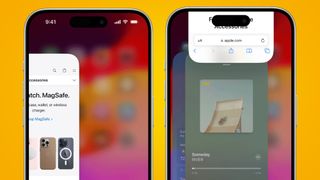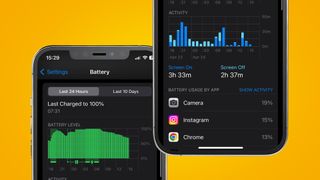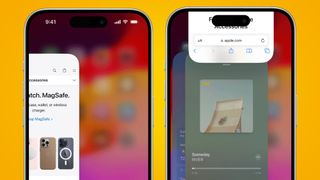Most of us will habitually close iPhone apps by flicking them away from the center of our home screen. This is often based on a hunch that force-quitting apps surely squeezes more juice from the battery and improves performance. But do you need to bother closing them, at all?
Surprisingly, the answer is no. Apple‘s own guidance on closing apps says that “you should only close an app if it’s unresponsive”. And there’s a good reason for that – iOS has long been designed to make sure background apps barely touch your iPhone’s RAM or CPU.
A few years ago, Apple’s own Craig Federighi (Senior vice president of Software Engineering) even weighed in on the topic to put this myth to bed. Here’s what he had to say, plus a technical explanation so you can impress your iPhone-owning friends with your knowledge…
The myth: Closing apps on your iPhone will save battery life
Closing iPhone apps is both cathartic and instinctively feels like the right thing to do if your battery’s in the red. But it doesn’t actually help your battery life, RAM or CPU, and opening and reopening apps could even have a negative impact.
Apple’s SVP of Engineering, Craig Federighi, even commented on the topic a few years back. According to MacRumors report from 2016, a reader emailed Tim Cook directly for a definitive answer to the app closure question and claimed to have received a response Federighi.
The email asked “Do you quit your iOS multitasking apps frequently and is this necessary for battery life?”. Craig’s reply was brief and to the point stating “no and no”, after which he thanked the emailer for being an Apple customer.

While we haven’t seen the email directly, MacRumors reported that the email’s headers were verified. And Apple’s subsequent advice on closing apps has always backed it up, with its main guide stating that “you should only close an app if it’s unresponsive”.
Of course, iPhones since then have steadily received memory boosts, going from 128MB to 8GB of RAM. And modern apps are also more demanding than they were in 2016. But most background apps in iOS are simply suspended or frozen, which frees up the RAM they’d otherwise use.
Why it doesn’t help
iOS is very efficient at suspending apps that are not being used – those apps are then effectively frozen in the background. The suspended apps aren’t really hitting your battery or performance. The fact that you can still see them when swiping up from the bottom of your homescreen is just a visual indicator, letting you know that they were open recently and are ready to resume when needed.
While it feels counter-intuitive, it’s often better for battery consumption to just leave the apps alone until you need them. This is because closing apps just to have to open them again later is often more battery-intensive than just leaving them suspended in the background.

The initial launch of most apps requires a brief spike in power to load and gather the app’s data. An app suspended in the background simply consumes less energy, although the likes of Spotify, Apple Music or GPS navigation can continue to draw some power if they’re still being actively used in the background.
If you suspect that an app is draining your battery life, you can check by going to Settings > Battery and scrolling down to see ‘battery usage by app’. To stop an app from running in the background, you can also go to Settings > General > Background App Refresh and toggle the specific app off.
A better way to keep your iPhone running smoothly is to simply remove unused apps, and regularly delete or copy large files off your iPhone. While there’s something undeniably satisfying about closing apps, remember that it’s unlikely to help your iPhone’s battery life or performance (and may even have the reverse effect).
You might also like
Services Marketplace – Listings, Bookings & Reviews
